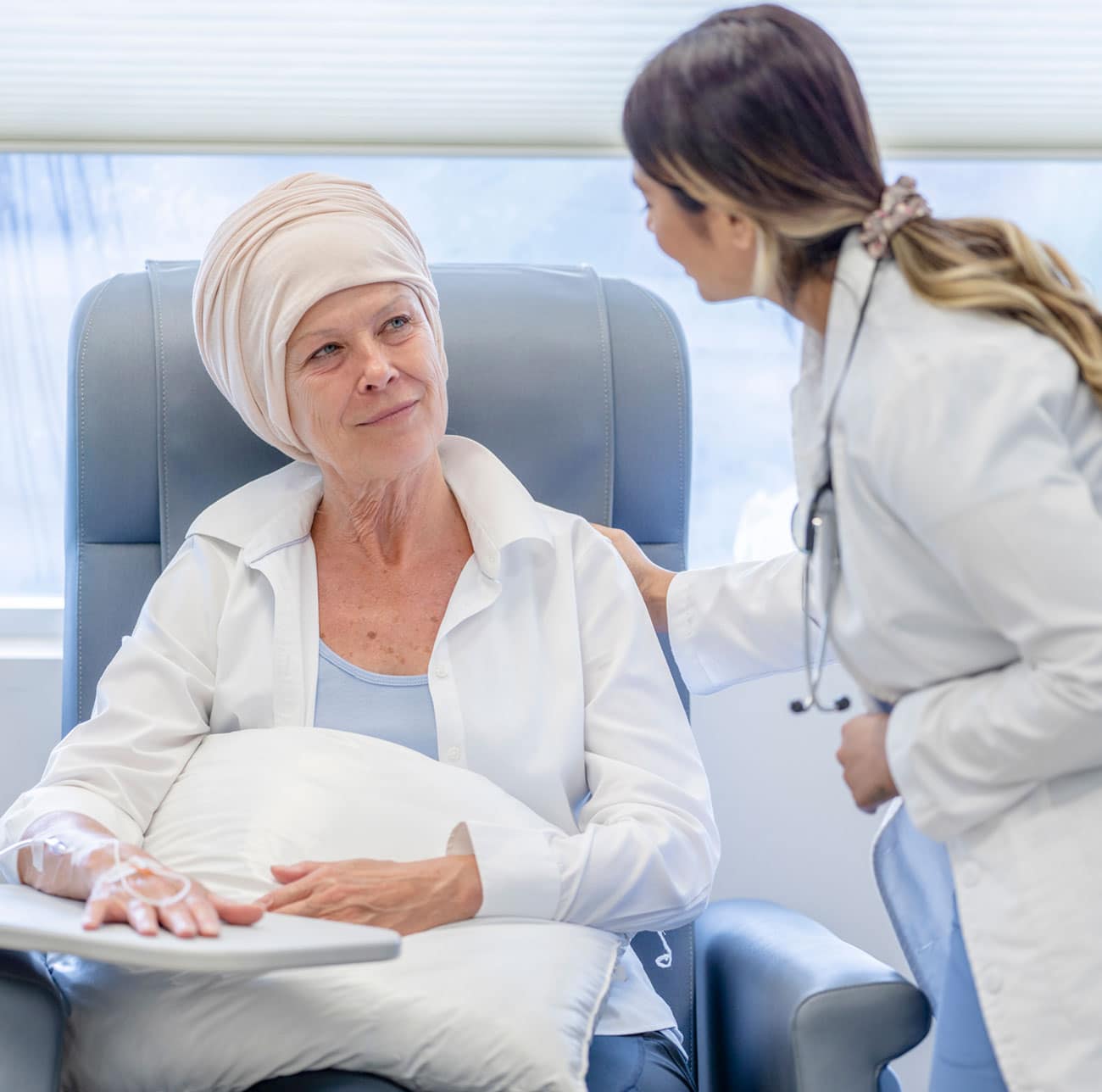Metastatic Breast Cancer:
Know the Facts.
Though Metastatic Breast Cancer (mBC) affects 168,000 women and men in the United States, most people know far less about this type of breast cancer than they do about early-stage breast cancer. This can lead to misconceptions about the diagnosis that leave mBC patients feeling isolated, misunderstood, and unsupported. Learning the facts about mBC can help patients, their friends and their families work together to face mBC with a positive outlook.
What Metastatic Breast Cancer is NOT.
Once diagnosed with mBC, patients will be in treatment for the rest of their lives. That’s why, when mBC patients are encouraged by well-meaning friends and family to “fight and beat” their cancer, they can feel misunderstood and alone.
mBC cannot be cured, but there are a variety of treatment options that can control the disease. When one treatment stops working, a new method can be tried. Many different treatments — alone, in combination, or in sequence —can be used. It is possible to live for years with mBC.
When patients develop mBC after previously surviving early-stage breast cancer, it doesn’t mean their treatment was ineffective or poorly handled, or that they skipped preventive measures like screenings. Even when everything is done right, patients can still get mBC.
mBC is considered Stage IV or advanced breast cancer. Unlike early-stage breast cancer, mBC cannot be cured, but it can be treated. Because 20%-30% of early-stage breast cancer patients will later be diagnosed with mBC, it’s important for them to get all routine checkups and screenings recommended by their doctor and take whatever preventive medications are prescribed. These precautions can reduce one’s risk, but can’t guarantee that one won’t get mBC.
Friends, family & caregivers: What you can say to help.
“I’m here for you.” Because mBC is a chronic illness, encouraging patients to “fight and beat” the disease is not helpful. Instead, let them know you are available to listen and support them.
“How is your treatment going?” mBC patients will be in treatment for the rest of their lives. So instead of asking when they’ll be “done,” ask about their current form of treatment, what kind of side effects it brings, etc. This shows your interest and helps you understand their challenges.
“Come with us to lunch.” Or shopping, or to a party. Sometimes friends or family members, unsure of what to say or do, simply stop asking mBC patients to join them. Instead, keep the invitations coming. If they don’t feel well enough to join you, they can decide that for themselves.
Living with Metastatic Breast Cancer:
treatments, strategies & resources.
Treatments for mBC.
There is no one-size-fits-all treatment for mBC; each person’s cancer is unique. Treatment depends on the location of the cancer, whether it is HER2 positive, negative or HER2-low, (HER2 is a gene that encourages cell growth), and the cancer’s hormone receptor status. Some of the more common treatments include:
- HORMONAL THERAPY
- CHEMOTHERAPY
- TARGETED THERAPY
- IMMUNOTHERAPY
- RADIATION THERAPY
More than one of these treatments may be used in combination. No one treatment will continue to be effective indefinitely. Generally, a treatment is used until it loses its effectiveness, and then new treatments are prescribed.

mBC patients should take their time finding a doctor they feel comfortable with, one who will partner with them to not only treat their condition, but also promote their quality of life.
In addition to medical treatments, lifestyle changes and less traditional therapies including the following, can improve patients’ quality of life.
| Exercise – Order our Thriving Again Survivorship Kit to get information on exercise and nutrition, an exercise stretch band and more | |
| Nutrition – Take advantage of our nutrition and counseling classes | |
| Mind-body practices | |
| Meditation and mindfulness exercises – Learn about meditation and mindfulness practices | |
| Body work therapies |
Sharsheret has many resources for women living with mBC, including educational materials, tailored kits, and more.
Maintaining mental health with mBC.
An mBC diagnosis affects patients both physically and emotionally. It is natural to feel scared, angry, and stressed. Some patients feel they have lost control of their life to cancer.
A therapist trained to work with mBC patients can be an important resource during this difficult time. Sharsharet can connect you with mental health professionals who are experienced in counseling cancer patients. Find one here.
Every patient deals with the emotional upheaval of an mBC diagnosis differently. Some mental health strategies offered by patients living with mBC include:

Need more information, guidance, and/or emotional support?
Tailored Kits and Materials
Our Voices: Blogs
“The Book of Life”
According to tradition, in the ten days between Rosh Hashanah, the start of the Jewish New Year,…
Being Diagnosed with Metastatic Breast Cancer Isn’t a Choice, But How You Learn to Live with It Is
Anger, fear, stress, sadness, and depression. They are just a few of the emotions that accompany a…
Accepting My Journey
My first and only child, Simon, was born in December of 2007. We couldn’t believe that this…
Working with Metastatic (Stage 4) Breast Cancer
It was the third time I had seen my doctor about debilitating left hip pain. I didn’t have…
The Margot Rosenberg Pulitzer and Sheri Rosenberg Kanter EmbraceTM Program is sponsored by:
 |
 |
 |
At Lilly Oncology, we know those living with metastatic breast cancer (MBC) deserve more. There has been progress made over the last few years in bringing forward new treatment options, but there is still more to be done to truly support the women – and men – living with this disease every day. Lilly Oncology is focused on raising more awareness through education, more research and more dedicated solutions to help empower people living with this disease because together, we can do more for MBC.
OUR VOICES: LIVING LEGACY VIDEO SERIES
Hear from women diagnosed with advanced cancer
The Living Legacies Program Made Possible by Generous Support from  and in Partnership with Memories Live
and in Partnership with Memories Live
What have been your biggest sources of support and strength while living with advanced cancer?
How has Sharsheret supported you?
What would you tell a woman newly diagnosed with or living with MBC or advanced ovarian cancer?
What do you want others to know about living with an advanced cancer diagnosis ?


